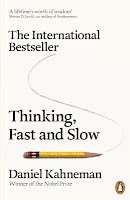Staff Review by Chris Saliba
 Our brains, according to veteran psychologist and researcher Daniel Kahneman, run at two speeds. System 1 is intuitive and emotional, with fast reaction times that protect us from immediate dangers. System 1, however, is prone to making mistakes. System 2 is more deliberative and analytical, with the power to fix up any of the hasty mistakes made by System 1. The bad news is System 2 is lazy and often needs prodding. Kahneman's wonderfully illuminating Thinking, Fast and Slow shows how we often mistake our instinctive, gut reactions for rational thought. Our tendency is to be blinded by a narrowness of focus when we need to step back, look at the larger picture and put things in their proper perspective.
Our brains, according to veteran psychologist and researcher Daniel Kahneman, run at two speeds. System 1 is intuitive and emotional, with fast reaction times that protect us from immediate dangers. System 1, however, is prone to making mistakes. System 2 is more deliberative and analytical, with the power to fix up any of the hasty mistakes made by System 1. The bad news is System 2 is lazy and often needs prodding. Kahneman's wonderfully illuminating Thinking, Fast and Slow shows how we often mistake our instinctive, gut reactions for rational thought. Our tendency is to be blinded by a narrowness of focus when we need to step back, look at the larger picture and put things in their proper perspective.Daniel Kahneman is a psychologist with several decades worth of experience in the fields of research and academic writing. Throughout his career he has proposed many theories on the way we think and searched out their truth by scientific testing and collaborations with other researchers. While he has penned many important papers on his findings, this is his first book. Thinking, Fast and Slow is a distillation of a lifetime of thinking and research into the subject of how our cognitive processes work. Kahneman also applies his theories to economics, demonstrating how our often unreliable decision making processes affect attitudes to money and risk taking (he won the Nobel Prize in Economics in 2002).
The title of the book pretty much describes its theory. We humans are endowed with two styles of thinking. System 1 is the fast mode, which is emotional and intuitive. In fact, this part of our thinking apparatus is so fast that Kahneman shows how our bodies react ahead of our brains to external phenomena. For example, if we sense danger we physically react before our brains have completed their cognitive assessments of the situation. The slow thinking mode, which is called System 2, is deliberative and logical. It has the power to carefully process the sometimes hasty judgements of System 1 and therefore help us to make more rational decisions. Unfortunately, System 2 is lazy and doesn’t always step in when needed. Sometimes we have to make snap judgements and System 2 simply doesn’t have the time to intervene.
That’s the basic premise of the book. Kahneman expands this into a fascinating and often challenging journey through the many erroneous roads we travel in our thinking. It’s often very human to think fast, to be blinded by our biases and to look at problems with a narrow focus. Kahneman highlights the need to step back, look at the larger picture and put things in their proper perspective. He notes that this can be hard, even for a trained psychologist like himself.
For example, in one section of the book he describes a spate of terrorist bombings that happened while he was living in Israel. He knew that the statistics showed his likelihood of being a victim of terrorism to be extremely low, but nonetheless he felt the same fear as that of the general public. Kahneman said he felt ashamed of being so fearful, but no amount of trying to rationalise with himself would help.
In a larger sense Thinking, Fast and Slow reads like a book of philosophical thought. Frequently I was reminded of Schopenhauer’s The World as Will and Representation. Kahnenman tells us that the world is a place full of random, senseless events. To cope with this chaos humans reach for a story or narrative to try and make sense of a world that often seems to make no sense at all. While this may be only natural, it still leads us into erroneous thinking. Kahneman even goes to so far as to say that the accomplishments of high achievers are in part sheer luck, and that we shouldn’t extol these people as super humans. Everything in life ultimately ‘regresses to the mean’, and standout achievements are in part lucky events that cannot be repeated over and over.
Kahneman wrote Thinking, Fast and Slow in a style which invites us to imagine ourselves and our behaviour in the world. The effect is to feel like you are standing in front of a psychological mirror, confronting all your cognitive faults. Reading it, you will no doubt pick up many errors in your everyday thinking. Hence Thinking, Fast and Slow has the power to make you look at yourself in an entirely new light. This is very enlightening reading in its truest sense.
Thinking, Fast and Slow, by Daniel Kahneman. Published by Penguin. ISBN: 9780141033570 RRP: $22.95
No comments:
Post a Comment